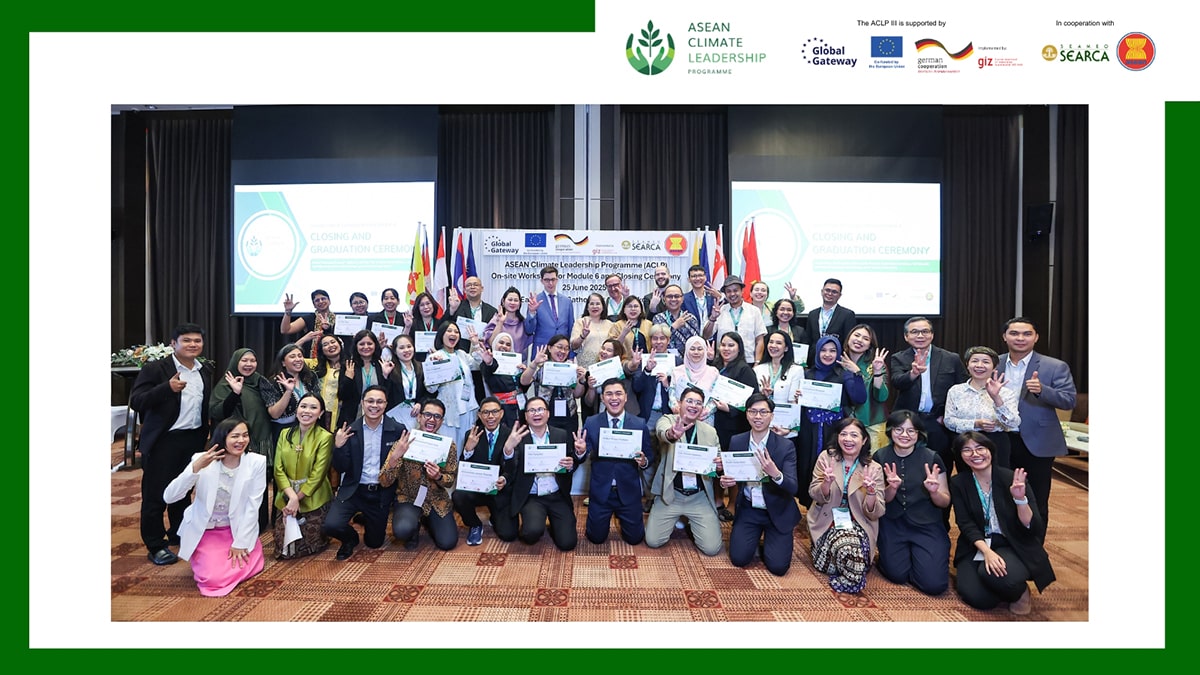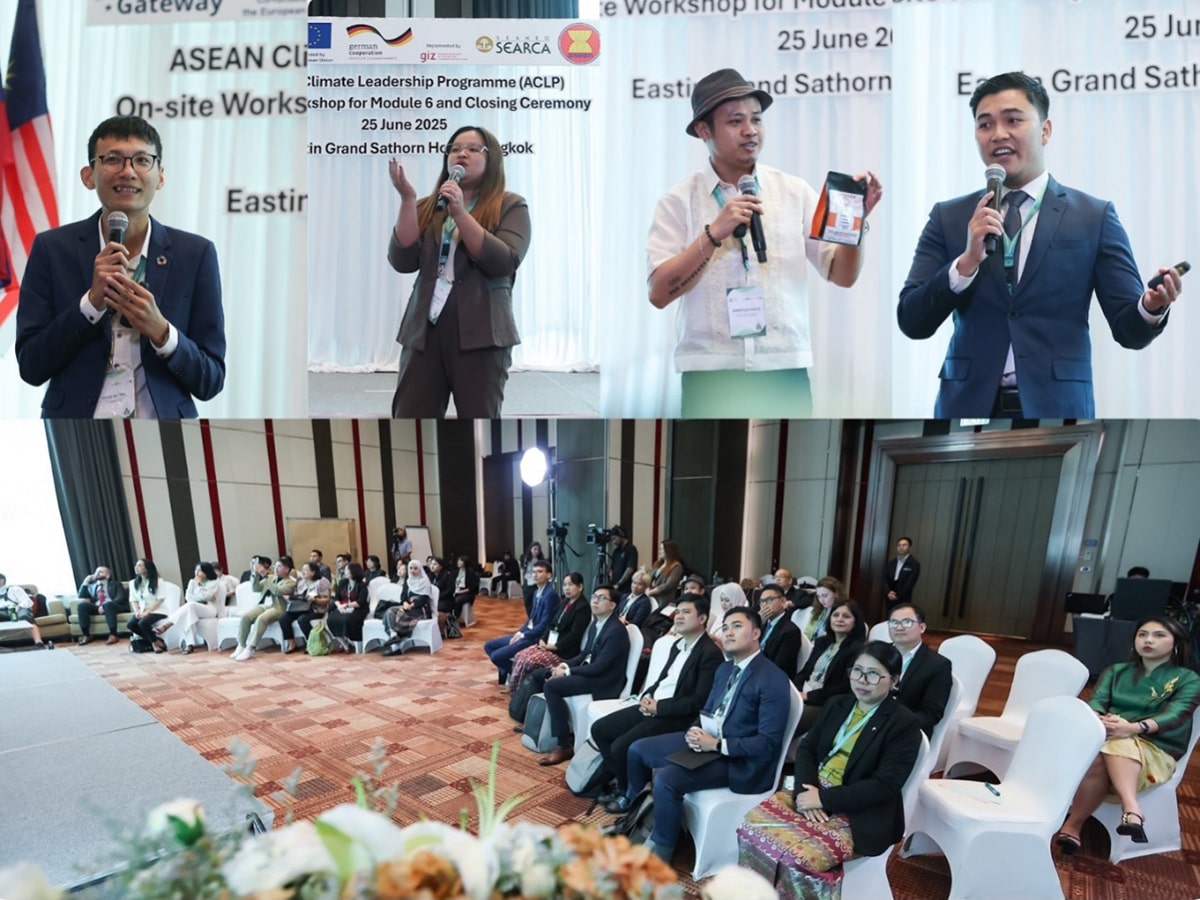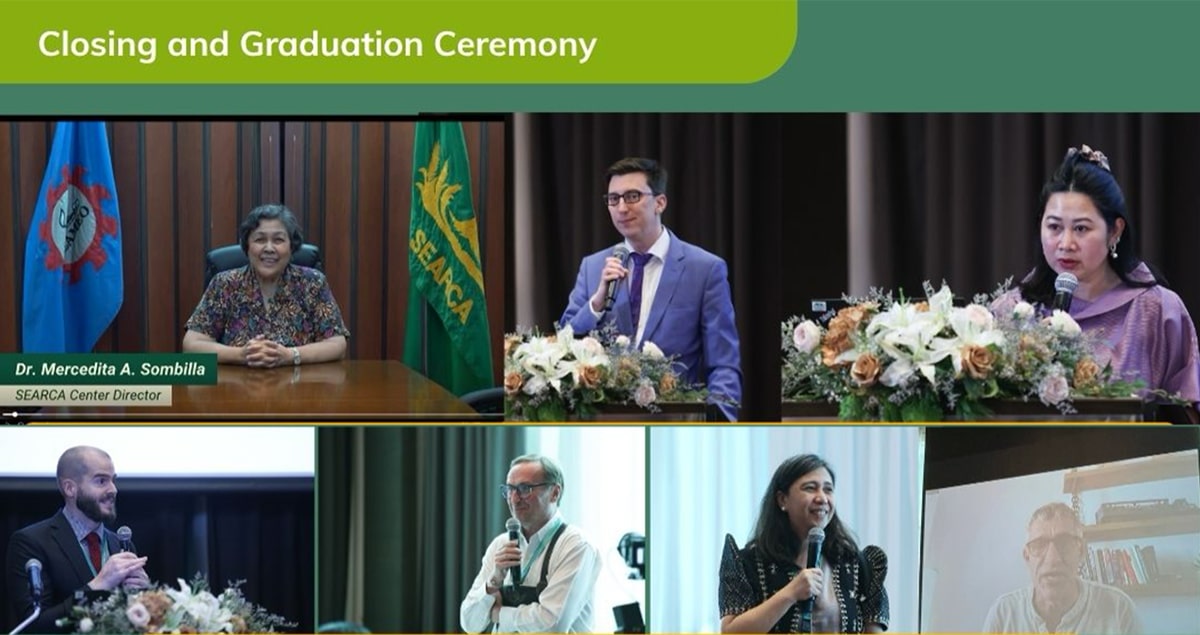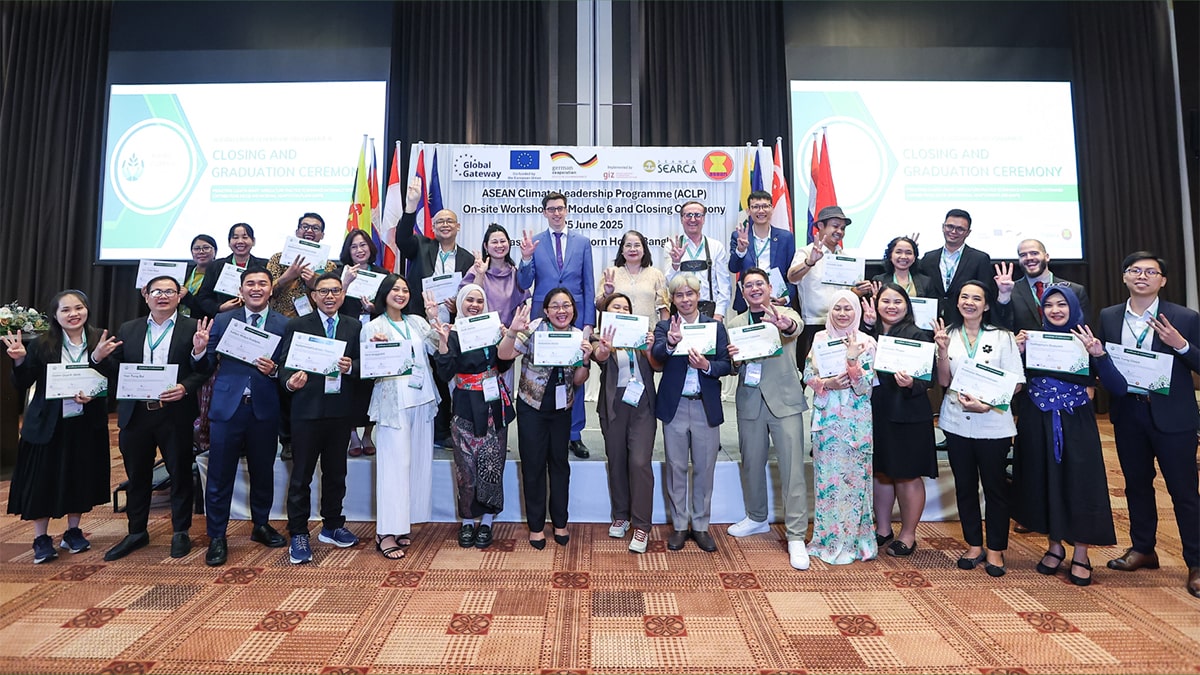 Photo courtesy of GIZ/Apisak Thuleewan, Van Tung Bui
Photo courtesy of GIZ/Apisak Thuleewan, Van Tung Bui
BANGKOK, Thailand—The third ASEAN Climate Leadership Programme (ACLP) concluded on 15 June 2025 with a final module session and graduation ceremony. The event brought together participants and distinguished guests to celebrate the culmination of a six-month journey in climate leadership.
The final module synthesized the program's models and featured the presentations of the participants' final Personal Change Projects (PCPs). This was followed by the closing and graduation ceremony, which honored the dedication of the participants along with the coaches, mentors, and the Secretariat team who conducted the ACLP III from January to June this year.
Twenty-four professionals in government institutions, research organizations, civil society, and the public sector from eight ASEAN Member States completed the program. Their active participation underscored their unwavering commitment to inclusive and effective climate action for a sustainable future in the ASEAN region.
Key takeaways from the learning journey
Ms. Gaynor Tanyang, Co-Facilitator, reviewed the program's core frameworks, including the ACLP leadership model, systems thinking, Theory U, and design thinking. She highlighted the importance of shaping and influencing others to drive positive change in leadership. Tanyang also emphasized the iterative nature of learning, the significance of listening, suspending judgment, and prototyping solutions. Participants reflected on these points, applying Theory U and integrated design thinking to their leadership journeys through empathy, ideation, and iterative testing of solutions.
Initial assessments of the ACLP III indicated that the three most useful concepts for the participants were climate-smart actions and practices in ASEAN countries, Theory U, and Gender and Inclusion. Participants also appreciated the learning on risk communication and the development of leadership plans.
They also reflected on the most important lessons learned from the program, emphasizing systems thinking, open-mindedness, and the importance of engaging with stakeholders. The program's relevance, leadership development, and technical sessions were highly evaluated, with most of the participants affirming the value and effectiveness of the program's content.
Translating learnings into action
 Photos courtesy of GIZ/Apisak Thuleewan, Van Tung Bui
Photos courtesy of GIZ/Apisak Thuleewan, Van Tung Bui
Participants presented the final versions of their PCPs to their mentors and peers in small thematic groups. During the plenary session, some of the highlighted PCPs included:
- Low technology solutions for women smallholders in Cambodia, emphasizing community engagement and gender inclusivity practices (inclusive and gender-responsive policy development group);
- An urban agri-development project featuring a mushroom farming initiative in the Philippines that aims to provide nutritious food sources and manage organic waste (climate and nutrition group);
- Varacco's Smart Farm – Farmer Scientist Training Program in the Philippines, focusing on modernising coffee production through technology and traditional practices (food systems group);
- Utilization of solar panels in remote islands in Indonesia, addressing the challenges of limited electricity access and the need for comprehensive analysis of solar energy implementation (emission reduction group);
- A video presentation on women's empowerment through organic farming in Bogor, Indonesia (inclusive and gender-responsive policy development group).
The presentations showcased innovative solutions and community impact, highlighting collaborative efforts to address local challenges and promote sustainable development in their respective localities.
Closing and graduation ceremony
 Photos courtesy of GIZ/Apisak Thuleewan, Van Tung Bui
Photos courtesy of GIZ/Apisak Thuleewan, Van Tung Bui
The 24 participants were recognized for successfully completing the six-month program on climate-smart agriculture and leadership. Dignitaries and representatives from the implementing agencies offered words of challenge and inspiration for the participants' post-ACLP journey.
In his closing message, Mr. Andre de Wit, Dean of the Amsterdam Leadership Academy and the program's lead facilitator, commended the participants for finishing strong. He also redefined VUCA to highlight the importance of Vision, Understanding, Connectedness, and Agility for future leaders.
Dr. Mercedita A. Sombilla, SEARCA Center Director, encouraged the ASEAN climate leaders to transition from learning to leading.
"It is our strongest hope that what you have gained from ACLP will be translated into real climate action, be it in strategic planning, capacity-building, research, or policymaking," she said.
Mr. Florian Miss, AgriTrade II Commission Manager of Deutsche Gesellschaft für Internationale Zusammenarbeit (GIZ), provided a comprehensive recap of the program's achievements and outcomes and expressed gratitude to all collaborators.
Ms. Teeraporn Wongchokprasit, Director of International Agricultural Affairs Group Planning and Technical Division of the Department of Agriculture in Thailand, reminded the climate leaders to inspire future leaders and maintain a robust network for transformational change.
Dr. Johannes Kerner, Counsellor for Economic Affairs of the German Embassy in Bangkok, inspired the ACLP III cohort on their next journey towards transformational leadership in the ASEAN region. He also reiterated the German government's continued support to ASEAN in developing solutions for climate challenges and a sustainable future.
The ceremony concluded with the handover of certificates, officially recognizing the participants' successful completion of the program.
